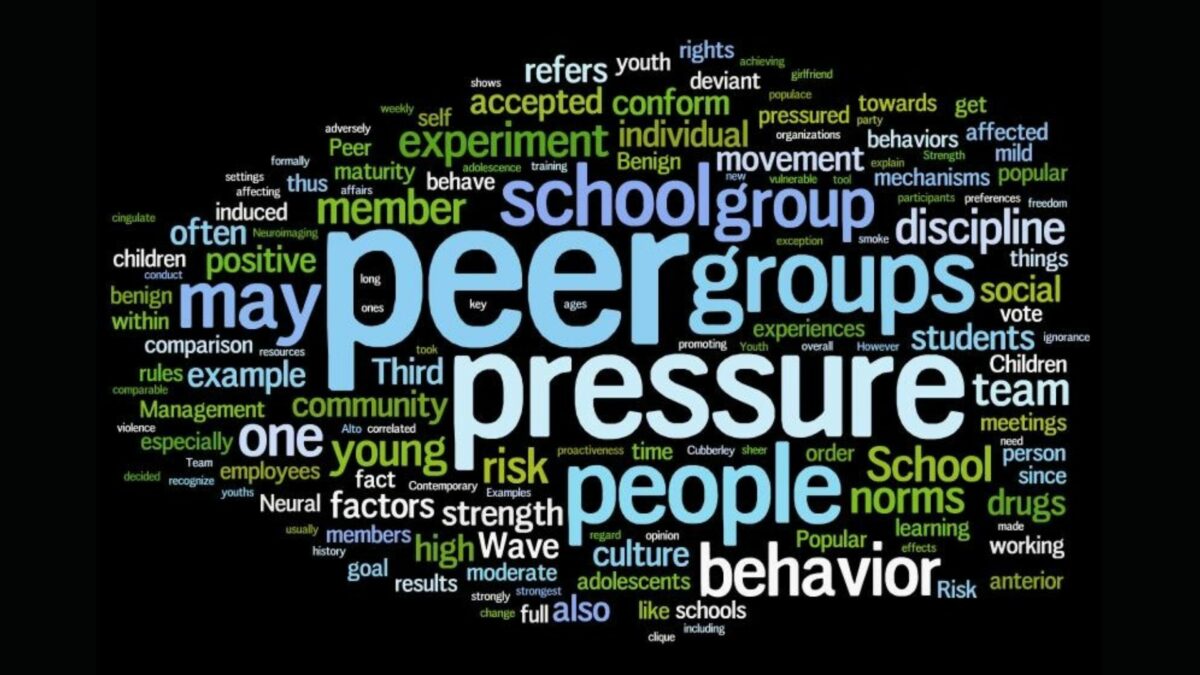“Hermits have no peer pressure.”
–Steven Wright

How many times when you were younger did you do something which you knew you shouldn’t have done, but you did it because all of your friends did it? I think about half of the ABC After School Specials I watched had to do with resisting peer pressure. The rest dealt with how a bill was made and Conjunction Junction. My mother had me convinced that all of my friends were going to run off of a cliff like lemmings, because she was always asking me how I’d react in a situation where all of my friends jumped off of a cliff or a bridge or some other such scenario involving finding out the hard way how gravity really worked. If I learned one lesson out of childhood (besides FIRE HOT), it was that peer pressure was bad and I should resist it and be my own person.
What if I were to tell you that peer pressure can actually do some good in your life? After all, as a study by the University of Rochester’s Eugene Kandel and the University of Chicago’s Edward Lazear shows, peer pressure is effective when the result of the pressure has an effect on the person being pressured and the peers applying the pressure actually have the ability to influence outcomes. However, the effect on the recipient of peer pressure, as we can all attest in thinking back to the middle school days of wanting to be a “cool kid,” doesn’t have to be financial. It can certainly be psychological and emotional, and often the ability to influence is similarly social or psychological.
Simply put, Monkey Brain likes to run in a pack, and he gets upset when he doesn’t get to show off in front of his friends.
How can you put this to use to your advantage?
We’ve already talked about using a personal finance accountabilibuddy and how it can benefit you in your life. Now, we’re going to come up with some concrete examples of how to leverage the concept.
- Use peer pressure to increase your savings. Some people take advantage of automatic savings programs, such as 401(k) contributions and matches. However, for those who don’t, or for those who are self-employed, the lack of an easy automatic savings mechanism means that we simply don’t save like we should.
A study by Columbia’s Stephan Meier, Harvard’s Dina Pomeranz, and Pontifica Universidad Catolica de Chile’s Felipe Kast showed that people who had weekly peer group sessions to talk about how much they’d saved that week saved 3.5 times as much as those who didn’t. Don’t have time for group savings therapy every week? The use of text messaging – “I saved $X. How much did you save?” was shown to be 80% as effective as the peer group sessions, meaning 2.8 times as much savings as those who didn’t use either method.
The conclusion of the paper was that peer influence and actual focus on savings were the two contributing factors to the success of the program. So, either schedule a 5 minute call with an accountabilibuddy every week to talk about how much you saved, or set a calendar reminder to send a text to your accountabilibuddy revealing how much you saved.
- Use peer pressure to become more handy. I am not handy, I confess. My Dad called me “anvil” when I was a kid, as in “you could break an anvil.” My idea of fixing a tank when I was in the Army was to beat it with a large crowbar until it worked, and when that failed, bribe my crew of mechanics with pizza and Mountain Dew. For some reason, the latter approach worked more often.
However, you can use peer pressure in your favor. The next time someone talks about a home renovation project that they’re working on, offer to help. Provide elbow grease in exchange for learning something. The act of watching someone else and helping them work on their own home will both teach you skills for how to be more accomplished at doing so for your own house as well as provide a little positive peer pressure not to call the handyman the next time the light bulb burns out.
- Use peer pressure to find more bargains. When I lived in Charlottesville, Virginia, I had a friend who would get up every Saturday morning and be the first to arrive at yard sales. He got some great deals by finding treasures in other people’s junk. Of course, he often found junk. Still, hearing him talk about finding bargains made me want to spend less – why buy something new when I could pay a steep, steep discount for something gently used?
You can use this same approach to adjust your spending behaviors. Find that friend who loves yard sales and tag along. Identify something you want/need in your place and set a very low price for what you’d be willing to pay for a reasonable item if you can find one. Make it a competition – see who can get down to the lowest price, and then buy it. You’ll get what you need, you’ll have bought something and reduced your chances of a subsequent unhappy impulse buy, and you’ll have used peer pressure to reduce you penchant for buying things new off the rack.
How have you used peer pressure to positively influence your life? Tell us about it in the comments below!
Author Profile
- John Davis is a nationally recognized expert on credit reporting, credit scoring, and identity theft. He has written four books about his expertise in the field and has been featured extensively in numerous media outlets such as The Wall Street Journal, The Washington Post, CNN, CBS News, CNBC, Fox Business, and many more. With over 20 years of experience helping consumers understand their credit and identity protection rights, John is passionate about empowering people to take control of their finances. He works with financial institutions to develop consumer-friendly policies that promote financial literacy and responsible borrowing habits.
Latest entries
 Low Income GrantsSeptember 25, 2023How to Get a Free Government Phone: A Step-by-Step Guide
Low Income GrantsSeptember 25, 2023How to Get a Free Government Phone: A Step-by-Step Guide Low Income GrantsSeptember 25, 2023Dental Charities That Help With Dental Costs
Low Income GrantsSeptember 25, 2023Dental Charities That Help With Dental Costs Low Income GrantsSeptember 25, 2023Low-Cost Hearing Aids for Seniors: A Comprehensive Guide
Low Income GrantsSeptember 25, 2023Low-Cost Hearing Aids for Seniors: A Comprehensive Guide Low Income GrantsSeptember 25, 2023Second Chance Apartments that Accept Evictions: A Comprehensive Guide
Low Income GrantsSeptember 25, 2023Second Chance Apartments that Accept Evictions: A Comprehensive Guide

